Want to hear more from the actors and creators of your favorite shows and films? Subscribe to The Cinema Spot on YouTube for all of our upcoming interviews!
Managing editor & film and television critic with a Bachelor's of Arts in English Literature with a Writing Minor from the University of Guam. Currently in graduate school completing a Master's in English Literature.
Trigger Warning: The white Europeans are at it again in this week’s episode of Donald Glover’s surreal comedy-drama, Atlanta. Prepare yourself for incoming headaches… The sixth episode of the third season is titled, “White Fashion”. It is written and directed by Ibra Ake.
In this review, I will be discussing Atlanta Season 3 Episode 6. There will be no spoilers here, as the title of this article suggests. Nonetheless, please read ahead at your own discretion to avoid any possible revelations.
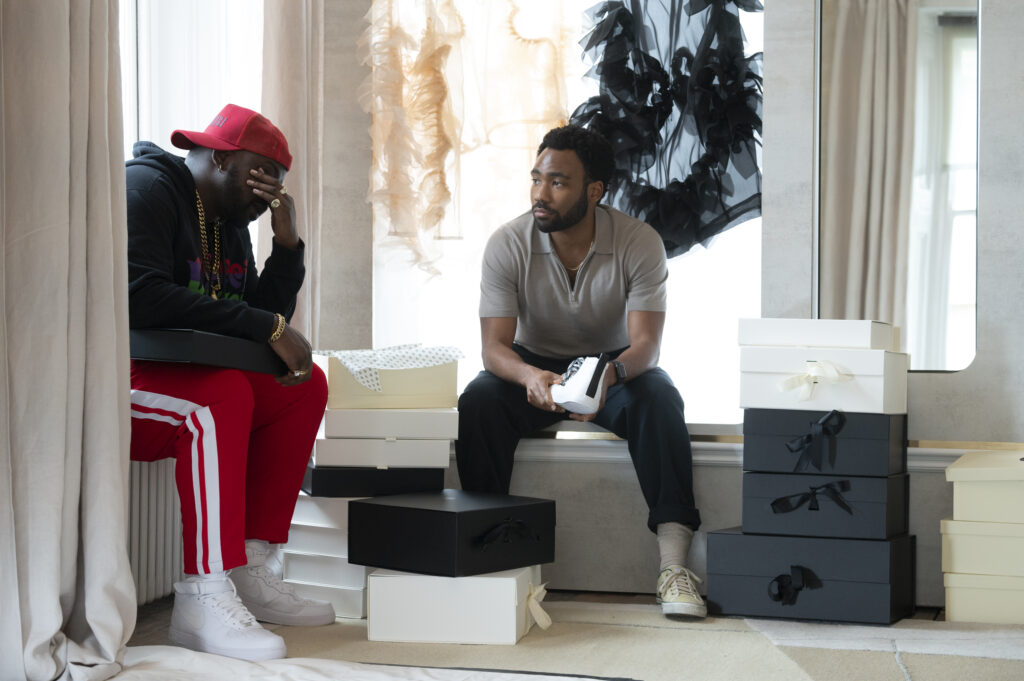
Plot Synopsis
According to FX Networks, here is the logline for Atlanta Season 3 Episode 6.
I’ve definitely seen this before on a better show. They’re always stealing ideas. But the fashion industry gotta be exposed #streetwear.
FX Networks Press Room
Discussion
Ake has always been a vital member of Atlanta‘s writers’ room throughout the course of the series. However, “White Fashion” marks their directorial debut in television; they had previously directed Beyoncé’s Black is King for Disney+. While this is their only directorial credit for the season, I would really love for them to return to the director’s chair in the final one. Throughout Atlanta Season 3, white people often prove prevalent over members of the Black community — from white lesbian foster mothers to the apparent theft of Paper Boi’s cellphone. This week, matters do not get any better.
Visually, “White Fashion” is appealing, and I must give credit to Murphy’s and Sprenger’s cinematographies, Green’s production design, Yau’s and Hasbourne’s costume designs, Coombes’s and Ayala’s set decorations, Armstrong’s and Ivey’s works on make-up, as well as Terry’s work on hair. The episode title itself implies an appropriation and takeover of culture through whiteness. In fact, this was made known in the season’s opening scene with “Three Slaps”; in the Season 3 premiere, a white man (Tobias Segal) — later revealed to be named “E” — described whiteness as the following:
People just become white. It’s social. White is where you are, is when you are… [With] enough blood and money, anyone can be white. It’s always been that way. The thing about being white is it blinds you. It’s easy to see the Black man as cursed because you’ve separated yourself from him, but you don’t know you’re enslaved just like him. Cold whiteness. You’re hypothermic, you lose logic. You see the blood, and you think someone else is bleeding.
“E” (Tobias Segal) in ‘Atlanta’ Season 3 Episode 1 — “Three Slaps”
The logline of this week’s episode itself seems like a subtle allusion to FX Networks’ other rap-centered television program, Dave. Although, I am not too confident about this as I have not seen that series.
The (White) Society of Control
To extrapolate on this notion of whiteness and its impact on Black culture, I want to cite the late French philosopher Gilles Deleuze’s 1990 essay, “Postscript on the Societies of Control”. Societies of control are the governing forces of what he asserts is “the new monster, one that [Michel Foucault] recognizes as our immediate future”; Foucault further elaborates on monstrosity in his lectures on abnormality. Deleuze argues that control has become a new weapon for societies and that corporations have taken the place of factories as a sort of spirit. Furthermore, he writes:
[The modern] societies of control operate with machines … computers, whose passive danger is jamming and whose active one is piracy and the introduction of viruses. This technological evolution must be, even more profoundly, a mutation of capitalism … a capitalism of higher-order production. … it buys the finished products or assembles parts. What is wants to sell is services and what it wants to buy is stocks.
Gilles Deleuze via “Postscript on the Societies of Control” (1990)
Corporations corrupt through their souls: marketing. Today, social media and devices connected to the Internet are key factors at play here, with the episode demonstrating this well in a clever manner.
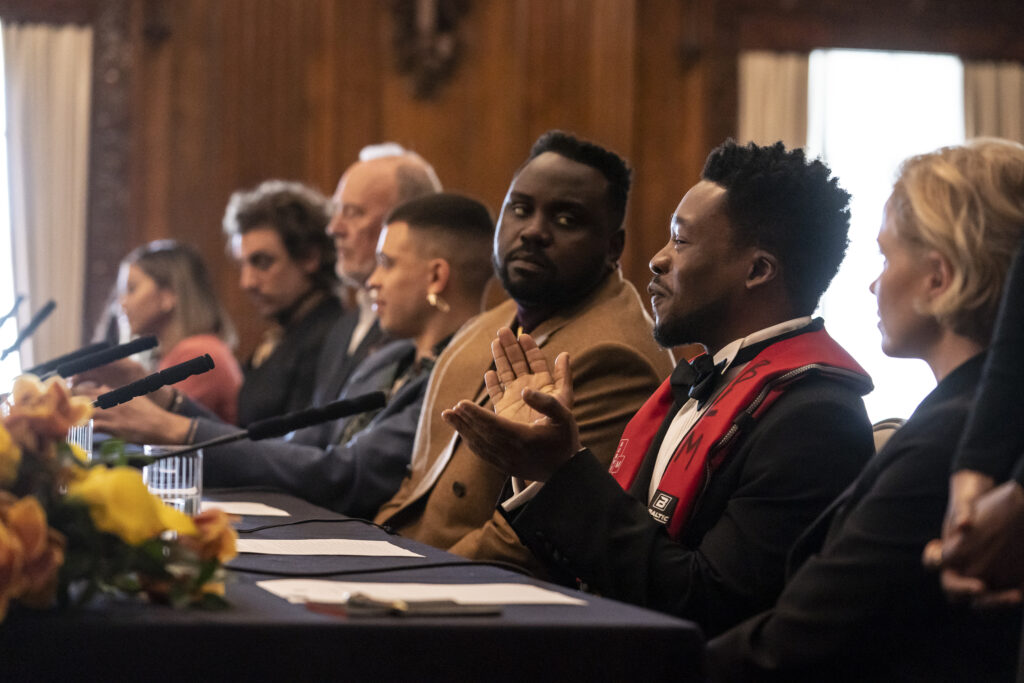
Application
In “White Fashion”, appropriation occurs in at least two areas — fashion brands and food establishments — and what makes this such a tough topic of discussion is the episode’s references to historical civil rights issues, including New York City’s Central Park case and, more recently, Black Lives Matter. Right from the get-go, we see how serious this is, with Temi’s “Fake Jersey” playing in the background, that racism in this way does not go away at the snap of a finger. Not all white people care for these causes; e.g., a character in the introductory scene lowkey puts on an ignorant facial expression and then does not allow a certain article of clothing to leave the room.
In the restaurant industry, we see an appropriation of West African, specifically Nigerian, cuisine. It is just devastating to watch. This is a callback to Darius’s (LaKeith Stanfield) discussion with Socks (Hugh Coles) in Atlanta Episode 303, “The Old Man and the Tree”, where they raise the question of whether Taco Bell — being an appropriation of Mexican cuisine — is racist as a chain and as an entity. (Speaking of Socks, he is nowhere to be found in this episode…)
Other Examples
I also found smaller details in the episode about what else is appropriated by capitalism. At one point, the adult film industry’s control over Black and colored bodies is addressed but immediately shut down. Moreover, the term “weeaboo” (which I also bring up in Episode 303) is mentioned; that is, non-Asian individuals who happen to appropriate media influenced by Asian, namely Japanese, culture. I mean, who else is trying to forget Nickelodeon’s The Last Airbender, Paramount’s Ghost in the Shell, and Netflix’s adaptations of both Death Note and Cowboy Bebop? God forbid what may happen with the Black Panther sequel…
As one character states, “Beauty is pain”; and so I can only imagine what that says on the topic of aestheticism…
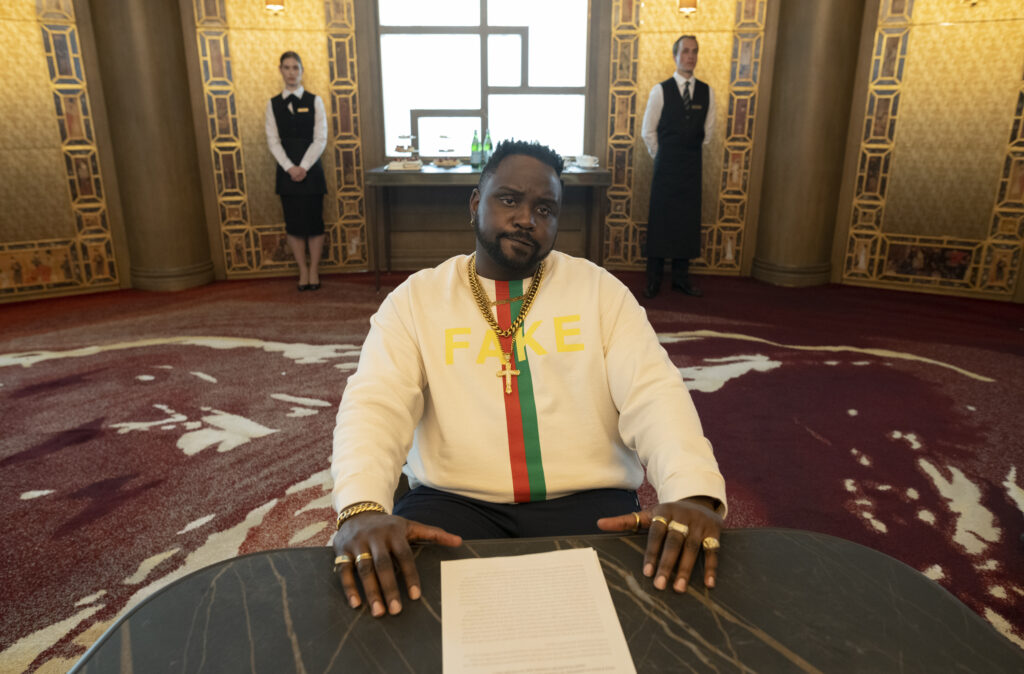
The Crew of Atlanta
Donald Glover, Paul Simms, Dianne McGunigle, Stephen Glover, Hiro Murai, and Stefani Robinson serve as the executive producers of the series. Janine Nabers serves as the co-executive producer, while Alex Orr, Cass Marks, and Kaitlin Waldron serve as the producers. Ibra Ake, Taofik Kolade, Jamal Olori, and Francesca Sloane serve as the supervising producers. Jordan Temple serves as the co-producer.
Alexa L. Fogel stars as the casting director. Kate Rhodes James serves as the casting director for the U.K., France, and the Netherlands, while Tara Feldstein Bennett and Chase Paris serve as the Atlanta casting directors. Francesca Bradley serves as the casting associate.
Stephen Murphy serves as the director of photography. Isaac Hagy serves as the editor of the episode. Jen Bryson and Cameron Ross return as the assistant editors.
Jen Malone and Fam Udeorji return as the music supervisors, with Whitney A. Pilzer as the associate music supervisor.
Jonathan Paul Green returns as the production designer of the episode. Lynda Armstrong serves as the head of the make-up department, while Shunika Terry is the head of the hair department. Celia Yau serves as the costume designer. Sophie Coombes returns as the set decorator.
In the U.S. unit, Christian Sprenger serves as the director of photography. Jennifer Ivey serves as the head of the make-up department, while Terry also serves as the head of the hair department. Tiffany Hasbourne serves as the costume designer. Kathryn Zamora-Benson serves as the casting associate. Liz Ayala serves as the set decorator.
The Cast of Atlanta
Donald Glover, Brian Tyree Henry, LaKeith Stanfield, and Zazie Beetz star as Earnest “Earn” Marks, Alfred “Paper Boi” Miles, Darius Epps, and Vanessa “Van” Keefer, respectively.
Gabriel Lo Giudice plays Marcelo, a fashion designer, while Kate Phillips plays Wendy, his business partner. Richard Clifford plays Bouchet, the chairman of Europe’s apparent diversity advisory board of the country’s Black Lives Matter cause.
Fisayo Akinade portrays Khalil, a Black man who spearheads the Open Arms charity organization. Aaron Heffernan plays Demarco. Roxanne McKenzie plays Rose, a handicapped member of the cause, while Jan Le plays Sam.
Tamsin Topolski plays Sharon, a white woman who serves as the cause’s head of hospitality. Opposite her, Anita-Joy Uwajeh appears as Eniola, the appointed liaison for the cause. Josephine Samson plays Mimi — a Nigerian waitress and owner of a West African restaurant.
Thomas Langridge plays a French boy. Imogen Daines plays Francesca. Selina Youngerman plays a foreign reporter. Steven H. Li plays an employee of a food truck, while Hannah Bourne appears as a jogger.
Regi Huc plays a concierge, while Gina Costigan portrays a woman.
Performances and Character Developments
Once again, Henry performs brilliantly as Paper Boi. I did pose the argument last week that fame has gotten to his head but is aware that it has also happened to his cousin. Now that he is without his phone, clarity does return to him. In “Robbin’ Season”, he warns Earn that he may not be cut out to be a manager in the music industry. Similarly in “White Fashion”, Earn warns Alfred that his image as a role model and leader could be tarnished. Earn suggests how to properly contribute to the cause. However, Paper Boi’s ultimate decision has made matters harder to deal with.
Returning to my past discourses on the mega-machine (i.e., capitalism) in relation to Atlanta, Paper Boi wants to be a part of a different society; in this episode, he wants to be a cog in the machine that has turned its back on the Black community. This clearly and almost completely reverses something he’s expressed in Season 2’s “Woods” episode with Ciara (Angela Wildflower). As a matter of fact, I would be distraught if this lovable character actually does end up this way.
Glover’s Earn has proved successful as Paper Boi’s manager, especially since he has struggled in the past two seasons to get to this point. This is evidenced in every episode of Season 3 that he’s appeared in thus far; namely, “Sinterklaas is Coming to Town”, “The Old Man and the Tree”, and “Cancer Attack”. His dynamics with both Alfred and Van (Zazie Beetz) in this week’s episode are meaningful, and they do show that he, too, can change. In one scene, we see Earn sitting next to a mirror reflection of Alfred. This would indicate that their respective circumstances very much are one and the same.
No One Can Top Us
EDITOR’S UPDATE: Additionally, I must point out Glover’s argument that this current season and next season cannot be topped by any other television program aside from HBO’s The Sopranos. Throughout Atlanta, Earn has never been fair with his then-partner, Van. This season, Van has shown that she is trying to be more independent in her identity as a woman — given in the Season 2 episode, “Helen”, where people only know her as “Lottie’s mom” –; however, Earn is even more controlling, now that he has found his governing place as a music manager.
We can liken their dynamic at this point in the series to that of Antonio “Tony” Soprano and his wife/ then ex-wife, Carmela Soprano, throughout the progression of The Sopranos. It does beg the question of whether we’ll truly get a Van-centric episode in the season’s final four episodes…
One Guest Character to Look Out For
Finally, I do want to bring up Akinade’s performance as Khalil who does know how to pull certain strings in his respective society of control. As Deleuze explains, such societies make use of codes or passwords that “mark access to information”. Khalil takes advantage of the system to ensure that he stays on top of his game. However, what this shows is that that strategy is not intended for everyone… And honestly, it should not be for anyone at all!
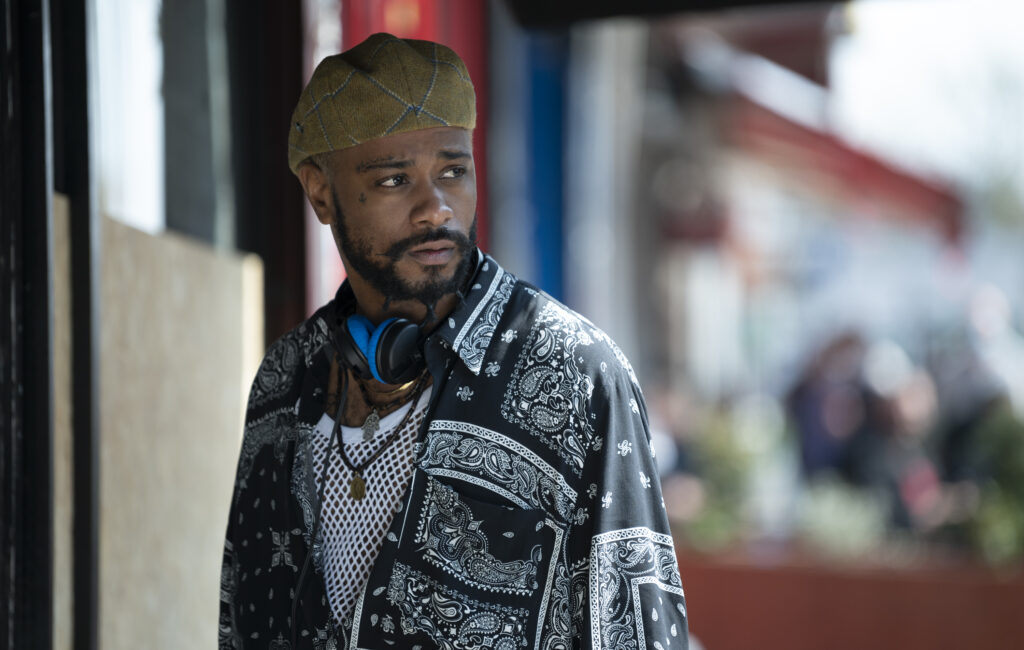
Final Thoughts on This Week’s Atlanta
“White Fashion” is tricky to create discourse on, although I am grateful that they even approach it. This episode of Atlanta has presented me with something new to ponder on. As a Person of Color critic (and not a Black one at that), I need to learn more and be educated on these causes. Oftentimes, I found this to be a harsh episode because it exhibits a reality that we all know too well. Black Lives Matter has gone most viral in May of 2020, and its prominence in that year has given many of us much to think about. Upon my second viewing, I could not just take it at face value. As grating as certain individuals have conveyed themselves here, I had to pause and take time to peel every single layer.
Alongside that, the show returns to a recurring element that happens in some of its previous episodes: Earn wakes up. I’m not sure what this means, but it does somehow tie back to something Darius tells Van in regards to ancestral simulations in Episode 207 — “Champagne Papi”. I’m excited to see how the third season wraps up, and at the same time, it’s sad to see the series inch closer to its conclusion.
Donald Glover’s Atlanta Season 3 is now on FX and streaming via Hulu!
Have you seen Glover’s series? If so, then what are your thoughts on it so far? Let us know! For more comedy and drama-related news and reviews visit and follow The Cinema Spot on Facebook, Twitter, and Instagram!
Managing editor & film and television critic with a Bachelor's of Arts in English Literature with a Writing Minor from the University of Guam. Currently in graduate school completing a Master's in English Literature.


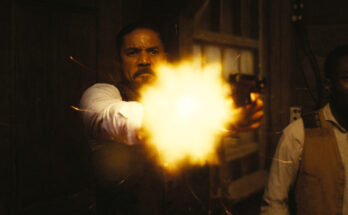


18 Comments on “‘Atlanta’ Season 3 Episode 6 Non-Spoiler Review – “White Fashion””